Four Tops
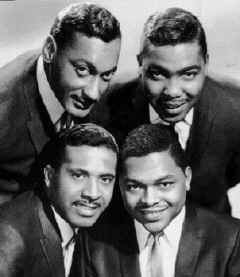
From top left clockwise:
Abdul (Duke) Fakir, Lawrence Payton, Renaldo (Obie) Benso, Levi
Stubbs
One of Motown's most consistent hitmakers and its longest lived
lineup (40 years), the Four Tops were the most stable and
consistent vocal groups to emerge from Motown Records in the
'60s, charting with scores of upbeat love songs featuring Levi
Stubbs' rough hewn lead vocals.
The Four Tops were products of Detroit's North
End.
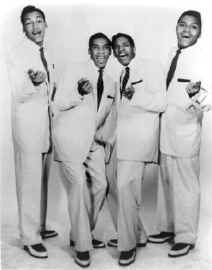
Four Aims
Levi Stubbs and Abdul "Duke" Fakir sang
together in a group while attending Pershing High School.
Renaldo "Obie" Benson and Lawrence Payton were boyhood
friends and attended Northern High together in Detroit who. It
was while singing at a friends birthday party in 1954 they found
they were good at it. They began practicing the next day and soon
began calling themselves the Four Aims.
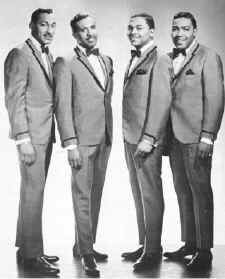
Roquel "Billy" Davis who was Larry
Payton's cousin, sometimes sang with the group as the fifth Aime
and was later to be Berry Gordy's songwriting partner sent a demo
tape to Chess Records in Chicago. They were sent a bus ticket and
invited to Chicago to audition. It seems that Chess was more
interested in Davis' writing skill than the group. However Davis'
persistence ended up with their being signed to Chess Records in
1956. They then changed their name to the Four Tops to avoid
confusion with the Ames Brothers. They only recorded one single
with Chess "Kiss Me Baby' which flopped. They then went
to Red Top and Riverside before they were signed by John Hammond
to Columbia in 1960 where they recorded "Ain't That
Love." This was the first of a string of supper club style
flops that lasted for seven years on a number of labels. All the
while, they were performing in top clubs. The Four Tops toured
with the Billy Eckstine revue in the early '60s.
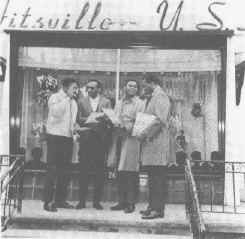
By 1964, they had signed with old friend Berry
Gordy's Motown Records. Gordy had them record "Breaking
Through" for his experimental Workshop Jazz subsidiary.
Later that year they were finally directed toward contemporary
soul. Under the wing of Motown's top production and
recording team, Holland-Dozier-Holland, the Four Tops were
launched with "Baby I Need Your Loving," which went to
#11 in 1964. Over the next eight years The Four Tops
appeared on the charts almost thirty times, and Levi Stubbs
became an international star and became an influence on singers
from the Sixties to the present time.
The Four Top's 1965 hits included "Ask the
Lonely" (#24), "Same Old Song" (#5), and "I
Can't Help Myself" (#1). "Reach Out and I'll Be
There" hit #1 in October, 1966, followed by
"Standing in the Shadows of Love" (#6) in 1967.
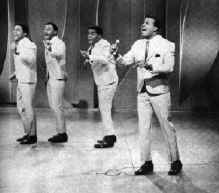
Like other Motown acts, the Four Tops became
popular in major nightclubs around the world. Like virtually all
of Motown's top acts, The Four Tops sought longevity and
stability of a career built equally on live appearances and
records. In 1967 they had hits with "Bernadette" (#4)
and "Seven Rooms of Gloom" (#14); but when
Holland-Dozier-Holland left in 1967, their charting hits
declined. In fact two of their bigger charting hits of 1968
were covers: the Left Banke's "Walk Away Renee" (#14)
and Tim Hardin's "If I Were a Carpenter" (#20).
However, the Tops did record a number of adventurous and
successful records with other Motown producers, including
"River Deep, Mountain High," with the Jean Terrell led
Supremes (#14 pop, #7 R&B, 1970) and "Still Water"
(#11 pop, #4 R&B, 1970. In addition Obie Benson
co-wrote Marvin Gaye's "What's Going On."
In 1972, the Four Tops moved to ABC/Dunhill
records where they recorded a couple of million sellers
"Keeper of the Castle (#10) and in 1973 "There Ain't No
Woman" (#4). It was only a brief pop chart resurgence, but
the Tops continued to have Top 20 R&B hits.
In 1981 they moved to Casablanca Records and had
a hit with "When She Was My Girl"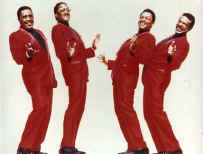 (#11 pop, #1 R&B). Two years later they were back at Motown
and after performing in a "battle of bands" with the
Temptations on the Motown 25th anniversary television special,
they began the first of several co-headlining tours with the
Temptations, billed as T 'n' T. The first tour ran nearly
three years, went around the world, and include sold out stint on
Broadway.
(#11 pop, #1 R&B). Two years later they were back at Motown
and after performing in a "battle of bands" with the
Temptations on the Motown 25th anniversary television special,
they began the first of several co-headlining tours with the
Temptations, billed as T 'n' T. The first tour ran nearly
three years, went around the world, and include sold out stint on
Broadway.
In 1986 Stubbs provided the voice for the
man-eating plant in the film Little Shop of Horrors. In
1985 the Tops had its last Motown hit "Sexy Ways" (#21
R&B). In 1988 they signed with Arista and recorded
"Indestructible" (#35 pop, #66 R&B).
In 1989 the Four Tops appeared on Arethea
Franklin's Through the Storm.
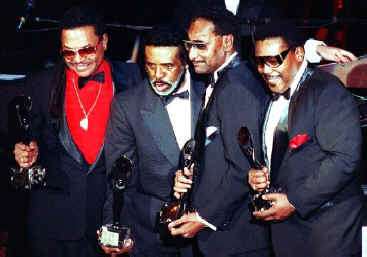
At Rock Hall Induction
(L-R) Lawrence Payton,, Levi Stubbs, Duke Fakir, Obie
Benson
|
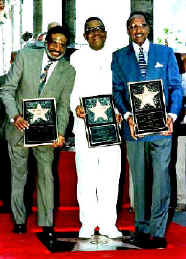
At Hollywood Walk
(L-R) Levi Stubbs, Obie Benson, Duke Fakir
|
In 1990 Steve Wonder inducted them into the Rock and Roll
Hall of Fame.in 1990
The Four Tops were inducted into the Vocal
Group Hall of Fame in 1999.
Levi Stubbs was diagnosed with
cancer in 1995, and after suffering a stroke in 2000, he was no
longer able to tour with the Four Tops. He died in
his sleep on October 17, 2008, at his home in Detroit.
Obie Benson died July 1, 2005 of lung cancer and other illnesses
at the age of 69.
Lawrence Payton died from liver cancer June 20, 1997 in
Southfield, Michigan at the age of 59.
Abdul (Duke) Fakir died of heart failure in Detroit on July 22,
2024, at the age of 88.






 (#11 pop, #1 R&B). Two years later they were back at Motown
and after performing in a "battle of bands" with the
Temptations on the Motown 25th anniversary television special,
they began the first of several co-headlining tours with the
Temptations, billed as T 'n' T. The first tour ran nearly
three years, went around the world, and include sold out stint on
Broadway.
(#11 pop, #1 R&B). Two years later they were back at Motown
and after performing in a "battle of bands" with the
Temptations on the Motown 25th anniversary television special,
they began the first of several co-headlining tours with the
Temptations, billed as T 'n' T. The first tour ran nearly
three years, went around the world, and include sold out stint on
Broadway.
